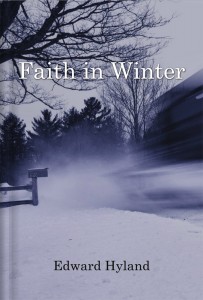In June I had the honor to contribute an introduction to a book of poetry, Faith in Winter, by a gifted writer and dear friend, Edward Hyland, a man I’ve known for close to thirty years. My wife, photographer Jennifer Smith-Mayo, was also asked to contribute to the book, as Ed chose one of her photographs for the cover. The honor to us both is even more important now, as Ed passed away recently.
From an early age, Edward Hyland was an impressive fellow. He gave his first poetry reading for the Boston Globe Book Festival at the age of sixteen. A year later he attended Bread Loaf Writers’ Conference as one of its youngest attendees to date, studying under Robert Hayden, Miller Williams, and novelist Harry Crews. He went on to study with Paul Jenkins, James Tate, Charles Simic, and other notable poets.
Ed worked in human services with developmentally disabled individuals for more than thirty years. He leaves behind a wonderful family: a wife, son, and daughter, and more friends than anyone I’ve ever known. I miss our frequent wide-ranging phone calls and occasional get-togethers over a pint (or three) of Guinness. I’m a lucky man to have known Ed Hyland.
The good folks at Many Voices Press have set up a fine tribute page at Facebook: https://www.facebook.com/faithinwinter, with links to the book for sale. You can also find the book here: http://www.blurb.com/b/6354570-faith-in-winter.
If you are a fan of top-notch poetry from a masterful writer, I am confident you will find much to like in this book.
Here is an excerpt, from the introduction, about Ed’s writing:
Hyland writes for himself, trusting that his concerns, his themes, his divulgences are familiar to many. His work is at times deceptive in its simplicity, flamboyant wording eschewed in favor of clear language, the tongue of his people, good, kind, hardworking folk who give all without reservation. Yet beneath that welcoming surface, his poems are a wonderful construct, an interdependence of working parts crafted over weeks, months, and years. Ed’s poetry is accessible to all who care to spend time with it. It does not require a skeleton key, appendices, or annotations. It requires the reader to be present. The poems do the rest.

